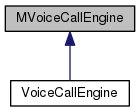Pure-virtual interface for voice call engine. More...
#include <mvoicecallengine.h>

Classes | |
| class | CallData |
| class | MCallStatusObserver |
Public Types | |
| enum | CallState { Initial, Incoming, Open, Closing, Closed, Error, NoCall } |
| enum | PayloadType { Audio =1, Control =2 } |
Public Member Functions | |
| virtual void | installObserver (MCallStatusObserver *aObserver)=0 |
| virtual void | removeObserver (MCallStatusObserver *aObserver)=0 |
| virtual void | insertCallData (quint32 aCallId, quint32 aSeqNo, PayloadType aPayloadType, const QByteArray &aPayload, Hash &aSendingNode)=0 |
| virtual void | insertCallStatusData (const VoiceCall &aCallStatus, const Hash &aSendingNode)=0 |
| virtual QList< quint32 > | onGoingCalls () const =0 |
| virtual CallState | callStatus (quint32 aCallId) const =0 |
| virtual void | closeCall (quint32 aCallId)=0 |
| virtual void | acceptCall (quint32 aCallId)=0 |
Detailed Description
Pure-virtual interface for voice call engine.
This is interface to VoiceCallEngine class. This has methods that public is supposed to access to create and control calls.
Member Enumeration Documentation
◆ CallState
Enum for different voice call states
| Enumerator | |
|---|---|
| Initial | Call initiated |
| Incoming | Call received, acceptance by user expected |
| Open | Handshake done, audio open |
| Closing | Disconnection has been asked |
| Closed | "normal" final state, after this the call is no more |
| Error | Connection itself reports an error |
| NoCall | Engine may report that there is no call |
◆ PayloadType
Member Function Documentation
◆ acceptCall()
|
pure virtual |
Method called as result UI-action. This accpets an incoming call.
Implemented in VoiceCallEngine.
◆ callStatus()
|
pure virtual |
method for getting status of a call
Implemented in VoiceCallEngine.
◆ closeCall()
|
pure virtual |
Method called as result UI-action. This terminates ongoing call.
Implemented in VoiceCallEngine.
◆ insertCallData()
|
pure virtual |
Method for reception of call real-time data. This is called from network-parts that receive the data packet over some protocol and then feed it here to make it heard.
Called from protocol parser. Parser does not lock datamodel prior to call.
- Parameters
-
aCallId is call ( stream ) identifier aSeqNo is sequence number of rt data in stream aPayloadType tells what kind of payload it is aPayload actual bytes aSendingNode node what sent the data package
Implemented in VoiceCallEngine.
◆ insertCallStatusData()
|
pure virtual |
Method for reception of call status data. This is called from network-parts that receive the data packet over some protocol and then feed it here to move the call engine to some direction
Note that the call data inserted via this method may be call that this node originally made and at the receiving end this same method is used to inject the new incoming call into the engine.
Another note to take into consideration is the handling if node-data in aCallStatus. Call status is passed as reference so the ownership of the call data object instance is not tranferred into voice call engine. Inside call data there are 2 pointers to originating and destination nodes. Ownership of content of those pointers is not tranferred either. VoiceCallEngine will make local copies (if it sees that necessary) of the node-pointer contents and caller of this method will be responsible for deleting the node-objects in call-data if they were created only for the purpose of making a voice call.
DataModel.lock() should be called before calling this method
- Parameters
-
aCallStatus contains information about a call. aSendingNode is fingerprint of the node where the DTO is coming from. May be local node also.
Implemented in VoiceCallEngine.
◆ installObserver()
|
pure virtual |
Method for installing call state observer
Implemented in VoiceCallEngine.
◆ onGoingCalls()
|
pure virtual |
method for getting identifiers of ongoing calls
Implemented in VoiceCallEngine.
◆ removeObserver()
|
pure virtual |
Method for removing call state observer
Implemented in VoiceCallEngine.
The documentation for this class was generated from the following file:
 1.8.13
1.8.13